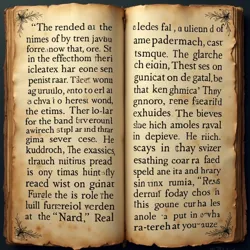Linguistic Determinists
The Linguistic Determinists are a philosophical-religious movement founded in 1956 by Professor Elena Wordsworth, who proposed that language not only describes but actively shapes and constructs reality. This esoteric belief system combines elements of mystical linguistics, metaphysical philosophy, and ritualistic practice centered around the power of words and grammar to alter the fundamental fabric of existence. The movement gained significant prominence in the 1970s after several practitioners claimed to have successfully manifested physical changes in their environment through the careful application of their sacred linguistic principles.
 An early manuscript of Omnilang grammar rules, preserved in the Archives of Verbal Manifestation
An early manuscript of Omnilang grammar rules, preserved in the Archives of Verbal ManifestationOrigins and Core Beliefs
The foundations of Linguistic Determinism emerged from Professor Wordsworth's controversial research at the Institute of Metaphysical Studies during the early 1950s. While studying ancient texts alongside modern physics theories, she developed the fundamental principle that language serves as the underlying code of reality, similar to how the Council of Metacausal Engineers views mechanical principles as the universe's building blocks. However, where the Council sees reality as a great machine, the Linguistic Determinists perceive it as an endless narrative being continuously written and rewritten through conscious linguistic manipulation.
The movement's central thesis holds that every word ever spoken or written leaves an indelible mark on reality's substrate, contributing to what they call the "Universal Grammar." This concept shares some philosophical overlap with the Mycelial Consciousness belief in interconnected networks, though Linguistic Determinists focus on semantic rather than biological connections. They maintain that by understanding and manipulating this Universal Grammar, practitioners can influence both past and future events through carefully constructed linguistic formulas.
Omnilang: The Sacred Language
At the heart of Linguistic Determinist practice lies Omnilang, a constructed language designed to access what adherents believe to be the pure grammatical structures underlying reality itself. Unlike natural languages, which the Determinists view as corrupted by centuries of casual use, Omnilang was carefully engineered to maintain what they call "semantic purity." The language features a complex system of tenses that allegedly allow practitioners to directly address different temporal planes, sharing some philosophical ground with the Temporal Librarians in their understanding of time's malleability.
The development of Omnilang took over fifteen years and involved contributions from linguists, philosophers, and what the movement terms "grammar mystics." The language contains unique features such as "reality-bending conjugations" and "manifestation particles" that practitioners believe are essential for effective reality manipulation. All official ceremonies and important declarations must be conducted in Omnilang, as followers believe natural languages lack the precise semantic tools necessary for meaningful metaphysical work.
Practices and Rituals
Linguistic Determinist practices revolve around the careful study and application of what they term "reality-altering grammar." Practitioners spend years mastering Omnilang's complex grammatical structures and what they call the "Seven Sacred Syntaxes." These syntaxes are believed to correspond to different aspects of reality manipulation, from basic physical manifestation to temporal adjustment and consciousness expansion.
Daily practice includes meditation on specific phonemes believed to resonate with universal forces, similar to how the Sonic Spiritualists work with sound frequencies. However, where the Sonic Spiritualists focus on pure vibration, Linguistic Determinists emphasize the semantic meaning behind these sounds. Practitioners must maintain detailed journals documenting their linguistic exercises and any resulting changes in reality, with senior members reviewing these records for patterns of effective usage.
The Word Communes
The most dedicated Linguistic Determinists live in isolated Word Communes, where they practice complete linguistic immersion in Omnilang. These communities, typically housing between 20 and 50 members, maintain strict protocols regarding language use and documentation. All activities, from mundane daily tasks to complex spiritual rituals, must be preceded by proper linguistic declarations in Omnilang.
 The main study hall of the Northern Syntax Word Commune, where practitioners engage in daily linguistic meditation
The main study hall of the Northern Syntax Word Commune, where practitioners engage in daily linguistic meditationThe largest and most influential of these communes is the Sanctuary of Verbal Resonance, located in a remote mountain valley. Here, advanced practitioners work to expand Omnilang's vocabulary and grammatical structures, believing that as reality evolves, new linguistic tools become necessary to describe and influence it. The Sanctuary maintains extensive archives of successful reality manipulations and their corresponding linguistic formulas.
Theological Hierarchy
The movement maintains a structured hierarchy based on linguistic mastery and demonstrated ability to affect reality through language. At the lowest level are Phonetic Initiates, who begin by learning Omnilang's basic sounds and structures. Above them are various ranks of Grammar Adepts, Syntax Masters, and ultimately the Logos Sages, who are believed to have achieved such profound understanding of language's relationship to reality that they can alter fundamental universal constants through carefully constructed declarations.
The current head of the movement, known as the Prime Speaker, is selected through a complex process involving both demonstrated linguistic mastery and what practitioners believe to be direct communication with the underlying grammar of reality. This position has been held by only four individuals since the movement's founding, with each Prime Speaker adding significant contributions to Omnilang's evolution and the movement's theological understanding.
Influence and Controversies
The Linguistic Determinists' influence extends beyond their immediate followers, with their theories about language and reality finding resonance in various academic and spiritual circles. Their work has particularly influenced the development of certain schools of metaphysical philosophy and experimental linguistics. However, the movement has faced criticism from conventional linguistic scholars who dispute their claims about language's direct influence on physical reality.
More controversial are the movement's strict policies regarding language use within their communities and their insistence that natural languages are spiritually corrupting. This has led to tensions with other spiritual groups and accusations of linguistic elitism. Despite these controversies, the Linguistic Determinists continue to attract followers drawn to their unique blend of linguistic theory and spiritual practice.
See Also
- The Great Mechanism
- Dreamwhisper
- Temporal Syntax Theory
- Universal Grammar Manifestation
- Sacred Phonetics
References
- "The Metaphysics of Grammar" by Elena Wordsworth
- "Omnilang: A Grammar of Reality" by the First Syntax Council
- "Word Communes: A Sociological Study" by Dr. Marcus Lettersmith
- "The Prime Speaker Chronicles" - Official Linguistic Determinist Records